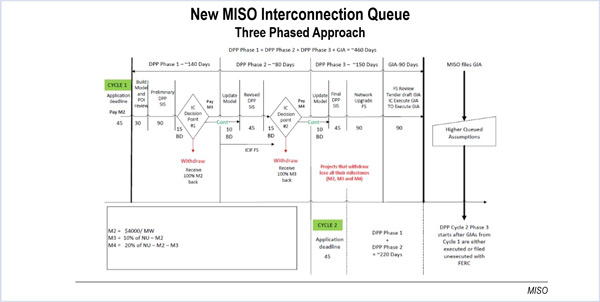By Amanda Durish Cook
FERC approved MISO’s second attempt at new interconnection queue rules, conditioned on the RTO allowing refunds for “significant” changes in upgrade costs and providing more detail on late-stage restudy scenarios.
MISO’s new queue process is designed to last 460 days and meant to reduce multiple unscheduled restudies by including mandatory restudies in each stage of the new three-part definitive planning phase. FERC said the design should minimize the backlogs that dogged the old queue by studying project withdrawals “on a more structured basis.”
FERC’s Jan. 3 order said that while the new queue proposed a longer official timeline than the old process, “the proposal is an improvement compared with MISO’s current study process that can take nearly two years due to unscheduled, ad hoc restudies.” MISO said the old queue process averaged 589 days. The changes formally took effect Jan. 4 (ER17-156).
In its transition plan, MISO plans to grandfather some late-stage interconnection requests. FERC said MISO’s transition “avoids the creation of an unwieldy study group.”
Two ‘Off Ramps’
The new queue creates two designated off-ramps for interconnection customers to withdraw projects; smaller but more frequent milestone payments that can be applied to an initial payment for the interconnection agreement; and a restriction on restudies after a generator interconnection agreement is executed. If a project is unexpectedly withdrawn, MISO can use milestone payments to fund network upgrades that would have otherwise been needed, lessening the financial burden on other projects that rely on the upgrades. After an initial $4,000/MW initial payment, the two subsequent milestone payments are based on a percentage of upgrade costs. (See MISO: Stakeholders Behind 2nd Queue Reform Attempt.) The changes also preserve the ability for MISO to enter provisional GIAs with customers for limited operation “at any time in the interconnection process.”
FERC had rejected MISO’s first queue proposal in March, saying the higher milestone payments could create barriers to entry and that the RTO placed too much blame for the queue’s gridlock on “speculative projects.”
“We find that MISO’s proposed changes to the Tariff address the commission’s previous concerns by implementing more transparent timing and cost information to enhance accountability in preparing timely interconnection studies, providing for more involvement of the interconnection customer in the study process and providing for earlier coordination with affected systems,” the commission wrote.
FERC also agreed with MISO that it should weigh stakeholders’ feedback before considering a provision that allows projects to withdraw penalty-free if substantial queue delays occur in the future.
Refunds for ‘Significant’ Changes
The commission ordered MISO to create a provision allowing refunds of milestone payments if “significant change” affects cumulative network upgrade costs while the project is in the queue’s definitive planning phase. It told the RTO to define the degree of change needed to trigger the refund and address the risk of “cascading withdrawals” that penalty-free exits could cause when crafting the provision. MISO’s revised filing proposed refund of milestone payments only if the network upgrade cost estimates increase 25% or more between the queue’s system impact study and the facilities study of the definitive planning phase.
Additionally, MISO must provide FERC semi-annual informational reports for two years describing the number and types of customers that experience changes in cost estimates for network upgrades greater than 25%. FERC also told MISO to clarify that the RTO does not intend to separately bill withdrawing interconnection customers for another interconnection customer’s restudies.
More Detail Required

The commission gave MISO 60 days to clarify what events could initiate a restudy for customers with GIAs. FERC said the RTO did not maintain the “existing language regarding restudies related to other types of upgrades or contingencies and has not explained why such existing language is no longer necessary.” The commission rejected the argument of MISO’s generation developers, who said restudies after an executed agreement should be banned altogether.
Per FERC’s order, MISO also has 60 days to add language to make scoping meetings mandatory for transmission owners. The RTO had only proposed mandatory scoping meetings for interconnection customers. FERC said transmission owner attendance is “essential to the purpose of that meeting, which is to discuss alternative interconnection options, to exchange information including any transmission data that would reasonably be expected to impact such interconnection options, to analyze such information and to determine the potential feasible points of interconnection.”
FERC OKs New Rule on Milestone Payments
In a related order also issued Jan. 3, FERC accepted MISO’s revised plan that applies the M2 milestone payment across all classes of interconnection customer, including external customers (ER16-1817-001).
“The Tariff changes will ensure comparable treatment for all customers, external or internal, existing or new,” FERC said.
After revising a service agreement last spring for the Louisiana Energy and Power Authority, MISO proposed that external customers should be exempted from interconnection milestone payments because the fees serve to deter speculative projects, and such generators are either in-service, under construction or have an executed interconnection agreement with the transmission provider to which they directly interconnect. MISO also pointed out that the fee is refunded once a generator begins commercial operations. FERC rejected MISO’s stance in October, saying it amounted to preferential treatment. (See FERC Orders MISO to Levy Interconnection Fees Equally.)
MISO said the new queue rules makes it “clear that the M2 milestone payment assessed to any customer is not zero.”





